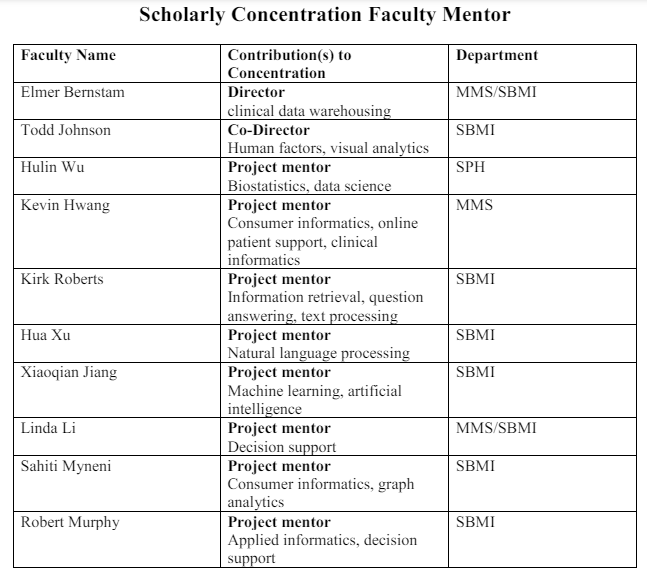Biomedical Informatics (SBMI)
Mission:
The goal of the biomedical informatics scholarly concentration is to provide a background in biomedical informatics, focusing on clinical informatics that will position the student to:
1) Participate in projects involving IT and informatics such as those related to electronic health records (EHRs) including the selection, implementation and management of EHRs
2) Prepare students for a career as a clinical informatics leader in academic medicine
3) Involve the student in informatics research including asking research questions, designing experiments to address the research question, conducting the experiment and publishing the results in a peer-reviewed forum such as an informatics or clinical journal
At the completion of the biomedical informatics scholarly concentration, students will:
1) Apply clinical informatics principles
2) Complete a research or applied informatics project leading to submission of a publication to a peer-reviewed forum
Director/Co-director:
Elmer Bernstam, MD
Reynolds and Reynolds Professor of Biomedical Informatics
Associate Dean for Research, School of Biomedical Informatics
Professor of Internal Medicine, McGovern Medical School
Administrative coordinator: Jamie Hargrave
Informatics competencies:
At the completion of the biomedical informatics scholarly concentration, students will:
1) Apply the fundamentals of biomedical informatics including:
a. Information science and technology
b. Social and behavioral science
c. Human factors and socio-technical systems
2) Communicate across professional boundaries
Maximum number of students/year: 3
Student selection process: Interview with the program director
Concentration requirements (didactic and experiential):
Students will be required to compete a well-rounded curriculum to include at least the two introductory courses in biomedical informatics (HI 5300 and 5310), reading of peer-reviewed journal articles and participation in the SBMI weekly research seminar. Students will also be required to complete at least one month-long elective in biomedical informatics. Student will be encouraged to attend conferences. Submission of a publication (conference presentation or journal/conference paper) describing the student-led project to a peer-reviewed forum is required for completion.
Timeline (years 1-4) for student completion of concentration requirements:
MS1
• Required:
o Application and acceptance into the program, including interview
o Attend weekly SBMI research seminar during the semester (can be done remotely via GoToMeeting; attend a minimum of 50% of sessions)
o Complete BMI 5300 Introduction to Biomedical Informatics (can be done remotely during any semester of the MS1 year)
o Identify a project mentor
o Submit project proposal iterate with project mentor until the project proposal is accepted
o Apply for Summer Research Program
• Optional:
o Present a research seminar
MS2
•Required:
o Attend weekly SBMI research seminar during the semester (can be done remotely via GoToMeeting; attend a minimum of 50% of sessions)
o Complete BMI 5310 Foundations of Biomedical Informatics (can be done remotely during any semester following BMI 5300 during the MS2 year; must be completed by start of MS3 year)
• Optional:
o Present a research seminar
o Conduct and submit a review (systematic or scoping) of the literature on a specific topic in biomedical informatics
o Attend AMIA Fall Symposium (with mentor approval)
MS3
• Required:
o Attend weekly SBMI research seminar during the semester (can be done remotely via GoToMeeting; attend a minimum of 50% of sessions)
o Continue work on project approved during MS2 year
• Optional
o Present a research seminar during any semester with the project mentor as sponsor/supervisor
o Complete an elective rotation in biomedical informatics (dedicated research elective)
o Attend AMIA Fall Symposium (with mentor approval)
MS4
• Required:
o Attend weekly SBMI research seminar during the semester (can be done remotely via GoToMeeting; attend a minimum of 50% of sessions)
o Present a research seminar during any semester with the project mentor as sponsor/supervisor
o Complete project
o Complete and submit publication (submission is the requirement, not acceptance)
• Optional
o Complete an elective rotation in biomedical informatics
o Attend AMIA Fall Symposium (with mentor approval)
Scholarly projects
a) indicate the types of faculty-mentored student scholarly projects available to students (e.g., basic research, clinical research, public health analysis, curriculum development, literature review, etc.):
In general, projects will involve the following steps:
1. Identify some important problem in biomedicine; this can be a clinical problem (e.g., diagnosis of systemic lupus erythematosus [SLE] is often delayed -> need earlier diagnosis of SLE) or research problem (e.g., identifying driver mutations in colon cancer)
2. Identify the underlying information problem (e.g., What is the probability of SLE in patients who do not yet have this diagnosis based on what is currently known about them including history, physical, laboratory studies, etc.?)
3. Implement some system or intervention, that may involve a computer program, to solve the information problem (e.g., decision support to alert clinicians when undiagnosed SLE is likely)
4. Determine whether the system or intervention solved the clinical problem
This process may involve:
Basic science research
Clinical research
Public health research
Curriculum development
Literature review and data analysis
b) indicate the procedure used to review and evaluate the students scholarly projects and outcomes (scholarly product):
The scholarly product is expected to result in at least one submission to a recognized, peer-reviewed forum such as a journal or (appropriate) conference (journal preferred). Acceptance of the submission is not required as there may be a long delay between submission and acceptance (or rejection). However, submission requires that the project mentor and co-authors (if any) approve the submission.
c) indicate strategies for dissemination of the scholarly product:
As above, in addition to the required a traditional student-authored abstract describing his/her project and its outcome.
